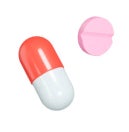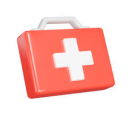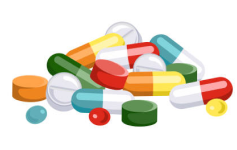Uses
What is Antihistamines for?
Antihistamines are used to relieve or prevent the symptoms of hay fever, itch, running nose and other types of allergy.
It works by blocking the effects of a substance called histamine, which is produced in the body. Histamine can cause itching, sneezing, runny nose and watery eyes.
Antihistamines comes most commonly in tablets or in liquid medicines. It can also be used in eye drops or nose drops/spray. There are also antihistamines that can be given via an injection to provide an immediate relief of serious allergic reactions.
Some of these medicines are available without prescription from your pharmacist. Others are only available on prescription.
How should I take or use Antihistamines?
Antihistamines may be prescribed regularly for a certain condition e.g. eczema or on as needed basis e.g. runny nose; it is important to follow the instructions stated on the medicine label for the specific antihistamine that you have been prescribed.
The number of doses to take each day and the time between doses depends on whether a short-acting (e.g. chlorpheniramine) or long-acting antihistamine (cetirizine) is prescribed.
Antihistamines can be taken with or without food: unless otherwise specified.
What should I do if I forget to take or use Antihistamines?
If you are taking this medicine regularly and you miss a dose, take it as soon as possible. However, if it is almost time for the next dose, skip the missed dose and continue your regular dosing schedule.
Do not double the dose to make up for a missed dose.
Precaution
What food or medication should I avoid when I take or use Antihistamines?
Inform your doctor or pharmacist if you have any allergies, pregnant/breastfeeding or taking any other medicines including over the counter medications before you start taking antihistamines. Alcohol may increase the sedative effect and should be avoided in general, especially when taking the sedating antihistamines.
Side Effects
What are some common side effects of Antihistamines?
Antihistamines are generally well tolerated.
Some antihistamine are more likely to cause drowsiness than others. Generally, drowsiness is less likely with the newer second generation antihistamines e.g. loratadine, cetirizine.
However, if you experience any of the following symptoms, rare but serious symptoms, contact a healthcare professional immediately:
- Fast or irregular heartbeat
- Convulsion
- Hallucination
- Shortness of breath or troubled bleeding
Handling
How should I store Antihistamines?
- Keep away from children
- Keep in a cool, dry place, away from direct sunlight
- Store at room temperature
- Store in the refrigerator. Do not freeze.
Ask your pharmacist about the proper storage conditions of the antihistamines you are taking.
For more information
What else should I know about Antihistamines?
First generation of sedating antihistamines can cause more drowsiness and dry mouth. This include chlorpheniramine, hydroxyzine, ketotifen and promethazine. This medicines may be used to improve your sleep should your sleep be disturbed by itching.
Non-sedating or second generation antihistamines are newer medicines which generally cause less drowsiness. These includes cetirizine, desloratadine, fexofenadine, levocetirizine, and loratadine.
Depending on your symptoms, the doctor may prescribed you a sedating or non-sedating antihistamine.
Disclaimers
If you take more than the recommended dose, please seek medical advice immediately. The information provided on this page does not replace information from your healthcare professional. Please consult your healthcare professional for more information.
This article is jointly developed by members of the National Medication Information workgroup. The workgroup consists of cluster partners (National Healthcare Group, National University Health System, and SingHealth), community pharmacies (Guardian, Unity, and Watsons), and the Pharmaceutical Society of Singapore. The content does not reflect drug availability and supply information in pharmacies and healthcare institutions. You are advised to check with the respective institutions for such information.
Contributed by
Last Updated on September 2018

Need More Medicine?
Use Medicine Order Service on HealthBuddy.

Medicines Reminder
Get reminders and chart progress on HealthBuddy.



















